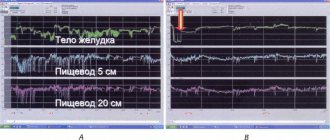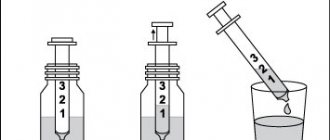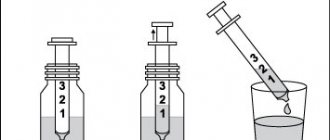pharmachologic effect
A laxative, the active ingredients of the drug are sodium picosulfate, which stimulates a laxative effect and acts in the colon, and magnesium citrate, which exhibits a laxative effect due to the osmotic effects of retaining moisture in the colon.
The effect of the drug is manifested in a strong flushing effect, which is combined with the effect of stimulating intestinal motility, which determines its use for cleaning the intestines before radiographic examinations, colonoscopy or surgical procedures.
Story
In 2014, the drug for preparing the colon for research and surgery, Picoprep (this is the Russian name of the drug), received registration in Russia. Trade names Pico-Salax or Picolax (Ferring) is a combination drug consisting of picosulfate sodium, magnesium oxide, citric acid and allows the use of small volumes of liquid to cleanse the intestines (up to 2.5 liters in two doses). This drug has been known and used in the UK and Australia for more than 20 years, and has been used in Canada since 2004. In the USA, it received approval for use from the FDA (Food and Drug Agency) and was distributed under the brand name Prepopic.
Contraindications to the use of Picoprep
- Congestive heart failure,
- impaired gastric emptying, gastrointestinal ulcers, toxic colitis, toxic megacolon, intestinal obstruction, nausea and vomiting, acute abdominal pathologies requiring surgical intervention, such as acute appendicitis, as well as diagnosed or suspected gastrointestinal obstruction or perforation,
- renal failure (due to the accumulation of magnesium in the blood plasma),
- children's age up to 1 year.
Picoprep por ship pack N2 (Novamedica)
The drug should be used with extreme caution in patients who have recently undergone surgical procedures on the gastrointestinal tract, as well as in patients with impaired renal function, heart disease or inflammatory bowel disease. The drug should be used with caution in patients taking drugs that may affect fluid and/or electrolyte balance. for example, diuretics, corticosteroids, lithium. Since Picoprep may alter the absorption of drugs intended for regular oral administration, it should be used with caution in such cases; Thus, there have been isolated reports of convulsive attacks in patients taking antiepileptic drugs, which previously allowed them to successfully control the course of epilepsy. Insufficient oral intake of water and electrolytes can lead to clinically significant deficiency, especially in weakened patients. Therefore, elderly and debilitated patients, as well as patients at risk of developing hypokalemia, should be under medical supervision. Patients with signs or symptoms of hyponatremia may require rapid corrective measures to restore fluid and electrolyte balance. A sufficient amount of fluid should be consumed. The bowel cleanse period should not exceed 24 hours, as a longer procedure may increase the risk of fluid or electrolyte imbalance. The drug contains lactose, so it should not be used in patients with lactose intolerance. The drug is not intended for use as a general laxative. Children The drug is used in children from 1 year of age under the supervision of a physician in a hospital setting. Use during pregnancy or lactation Clinical experience with the use of Picoprep during pregnancy is limited, so the drug should be used with caution, especially in the first trimester of pregnancy. Sodium picosulfate and magnesium citrate are not excreted into breast milk. Features of the effect of the drug on the ability to drive vehicles and maintain moving mechanisms. Taking into account the possibility of convulsions, seizures or confusion, during the period of use of the drug you should refrain from driving vehicles or working with other mechanisms.
Picoprep dosage
The day before hospitalization, it is recommended to switch to a low-calorie diet. To prevent dehydration while using the drug, it is recommended to drink a sufficient amount of water (about 250 ml per hour). The drug is administered orally.
Rules for preparing powder
The contents of one package are diluted in a glass of water at room temperature (about 150 ml), stirred for 2-3 minutes and the resulting solution is drunk. If the solution has become hot, wait until the solution has cooled to a temperature suitable for drinking.
Adults (including the elderly)
The contents of one package are diluted with water, as described above, and taken in the evening the day before the procedure, repeated after 6-8 hours.
Children
- 1-2 years: 1/4 contents of the package in the morning and 1/4 contents of the package in the afternoon;
- 2-4 years: 1/2 contents of the package in the morning and 1/2 contents of the package in the afternoon;
- 4-9 years: contents of 1 package in the morning and 1/2 contents of the package in the afternoon;
- 9 years and older: dosage as for adults.
The remaining solution is poured out. The prepared solution is not stored.
Preparation with Picoprep
FOLLOWING THE DIET
Preparation for a colonoscopy begins 3 days before the examination with a diet.
It is important to follow a diet!
Violation of the diet significantly worsens the preparation process, because... plant foods are excreted within 3-4 days (and in the presence of constipation - up to 6 days), despite taking a cleansing drug! Violation of diet affects the quality of research! It is PROHIBITED to completely exclude food intake, because... hunger does not affect the quality of preparation, but only causes you additional discomfort and worsens your well-being!
Allowed
Meat : dishes from lean beef, veal, meatballs, meat soufflé, egg, boiled chicken Low-fat meat broth
Fish: dishes from cod, pike perch, perch, pike (low-fat fish)
Dairy products: low-fat cottage cheese, cheeses, natural yogurt (no additives!), kefir, no more than 2 glasses of skim milk (if tolerated)
Tea, weak instant coffee, strained compotes, juices (without pulp, dried fruits, berries, grains)
Prohibited 3 days before the study
Flour products Porridges and cereals: all grain-containing products (whole grains, products made from crushed grains, nuts, poppy seeds, coconut flakes, etc.), bread, cereals, mushrooms, legumes, peas, lentils, etc. Vegetables and fruits: fresh , dried, thermally and cooked cabbage in any form, raisins and berries, especially with small seeds, all varieties of greens Soups: cabbage soup and borscht, milk soups, cream soup, okroshka Dairy products: yogurt with fillings (fruit , muesli), pudding, cream, sour cream, ice cream, full-fat cottage cheese Seasonings and canned food: hot seasonings (horseradish, pepper, mustard, onion, vinegar, garlic), seasonings (sauces) with grains, herbs, pickles, canned food, salted and marinated mushrooms, seaweed Drinks: kvass, sparkling water, prune drinks
When taking medications that color stool black: iron supplements (Ferrum-lek, Fenuls, etc.), bismuth preparations (de-Nol), activated carbon, vitamins, you should stop taking them 5 days before the test. If you have had an operation on the intestine with a stoma, then in addition to taking the drug, you need to prepare the “plugged” part of the intestine with an enema through the anus. You must have a spare colostomy bag with you!
If constipation is present, the patient takes laxatives for 3-5 days before the study (after consultation with his doctor or there are no contraindications) to achieve daily bowel movements.
One of the schemes is used at the discretion of the patient (in the absence of contraindications): • Forlax 1 pack per 150 ml of water - morning and evening • Magnesium sulfate (powder) 20 mg dissolved in 100 ml of warm water at night
PREPARATION WITH PICOPREP (contraindicated for epilepsy!)
Study from 8:00-10:00 On the day preceding the study day: Breakfast - 9:00. Lunch - 13:00 from permitted products. Dinner: clear liquids.
1. Day before the procedure: On the day before the procedure, take the contents of one packet of Picoprep dissolved in 150 ml of water at 22:00, then drink 1.5 liters of any clear liquid (water, juice without pulp) within 1.5 hours.
2. Day of the procedure: In the morning of the day of the procedure - at 9:00 (10-12 hours after the evening dose of the drug): take the contents of the second packet of Picoprep dissolved in 150 ml of water, then drink 1.5 liters of any drug within 1.5 hours clear liquid (water, juice without pulp). Add 1/4 bottle of espumizan to the last glass of the second dose of the drug.
Study from 10:00-13:00 On the day preceding the study day: Breakfast - 9:00. Lunch - 13:00 from permitted products. Dinner: clear liquids.
1. Day before the procedure: On the day before the procedure, take the contents of one packet of Picoprep dissolved in 150 ml of water at 22:00, then drink 1.5 liters of any clear liquid (water, juice without pulp) within 1.5 hours.
2. Day of the procedure: In the morning of the day of the procedure - at 9:00 (10-12 hours after the evening dose of the drug): take the contents of the second packet of Picoprep dissolved in 150 ml of water, then drink 1.5 liters of any drug within 1.5 hours clear liquid (water, juice without pulp). Add 1/4 bottle of espumizan to the last glass of the second dose of the drug.
Study from 13:00-19:00 On the day preceding the study day: Breakfast - 9:00. Lunch - 13:00 from permitted products. Dinner: clear liquids.
1. Day before the procedure: On the day before the procedure, take the contents of one packet of Picoprep dissolved in 150 ml of water at 22:00, then drink 1.5 liters of any clear liquid (water, juice without pulp) within 1.5 hours.
2. Day of the procedure: In the morning of the day of the procedure - at 9:00 (10-12 hours after the evening dose of the drug): take the contents of the second packet of Picoprep dissolved in 150 ml of water, then drink 1.5 liters of any drug within 1.5 hours clear liquid (water, juice without pulp). Add 1/4 bottle of espumizan to the last glass of the second dose of the drug.
1. Taking Picoprep and additional water should be completed at least 2.5-3 hours before the start of the study. 2. Don’t do enemas! 3. A criterion for good preparation is the appearance of transparent or slightly yellowish liquid stool.
COLONOSCOPY WITH ANESTHETIC SUPPORT BY APPOINTMENT ONLY!!! The patient must take the second dose of the drug no later than 2.5-4 hours before the start of the study, after which no liquids or food should be taken! If you consume liquids or eat food less than 2 hours before the examination, anesthesia assistance will be denied! On the day of the study, it is prohibited to drive a car or other means of transport, or do work that requires increased concentration!
For anesthesiological assistance during endoscopic examinations, the following is REQUIRED: • consultation with an anesthesiologist-resuscitator • for patients over 40 years old, to have an ECG (film + description) and a CBC with a deadline of no more than 14 days before the examination • for chronic pathology of internal organs, systemic diseases, regardless of age, a consultation with a therapist and an ECG is necessary, with a conclusion that there are no contraindications to anesthesia on an outpatient basis. • anesthesia package for (purchased at pharmacies located in the CDC “Health”)
!!! If contraindications are identified based on the results of the consultation, the patient may
Picoprep spike por d prig solution for oral administration pack 16.1g N2
Registration Certificate Holder
FERRING ARZNEIMITTEL (Germany)
Dosage form
Medicine - Picoprep
Description
Effervescent powder for the preparation of solution for oral administration
white, crystalline, with a faint orange odor.
1 pack
sodium picosulfate monohydrate 10 mg anhydrous citric acid 12 g magnesium oxide 3.5 g
Excipients
: potassium bicarbonate 0.5 g, sodium saccharinate dihydrate 0.06 g, orange flavor 0.06 g.
1 PC. — four-layer bags (2) — cardboard packs.
Indications
Cleansing the intestines before X-ray or endoscopic (colonoscopy) examinations and surgical procedures.
Contraindications for use
Chronic heart failure;
dehydration; weakness of gastric motility; peptic ulcer of the stomach and duodenum; toxic colitis; toxic megacolon; intestinal obstruction; nausea and vomiting; severe renal dysfunction; rhabdomyolysis; hypermagnesemia; acute surgical abdominal conditions: acute appendicitis, diagnosed or suspected gastrointestinal obstruction or perforation, recent gastrointestinal surgery; pregnancy (first trimester), children under 9 years of age. with caution
in patients with impaired renal function, heart disease, inflammatory bowel diseases, in patients taking drugs that affect water and electrolyte balance (diuretics, corticosteroids, lithium drugs), in the elderly (65 years and older) and debilitated patients during breastfeeding, during pregnancy (II and III trimesters), as well as in patients at risk of developing hypokalemia.
pharmachologic effect
Combined remedy.
Sodium picosulfate
has a local laxative effect in the colon.
Magnesium citrate
acts as an osmotic laxative by retaining water in the colon. Intestinal cleansing occurs due to a powerful “flushing” effect in combination with stimulation of peristalsis.
Drug interactions
This combination may affect the absorption of chronic oral medications ( antiepileptics, hypoglycemic drugs, oral contraceptives, antibiotics
).
Concomitant use with diuretics, corticosteroids
or
cardiac glycosides
increases the risk of developing hypokalemia.
Concomitant use with NSAIDs
, as well as with drugs that can cause the syndrome of inappropriate secretion of antidiuretic hormone or salt-wasting syndrome (for example,
tricyclic antidepressants, selective serotonin reuptake inhibitors, antipsychotic drugs and carbamazepine
) increases the risk of fluid and electrolyte imbalance.
Dosage regimen
Inside, one single dose is dissolved in 150 ml of water.
Side effect
From the immune system:
anaphylactic reactions, hypersensitivity.
From the side of metabolism:
hyponatremia, hypokalemia.
From the nervous system:
headache, epilepsy, grand mal seizure (without hyponatremia), convulsions, confusion.
From the gastrointestinal tract:
nausea, proctalgia, vomiting, diarrhea, abdominal pain.
For the skin and subcutaneous tissues:
rash (including erythematous and maculopapular), urticaria, itching, purpura.
special instructions
Not intended for use as a regular laxative.
In patients with signs of hyponatremia, urgent measures must be taken to restore water and electrolyte balance.
Contains potassium bicarbonate, which should be taken into account in patients on a low-potassium diet.
In patients with a significant decrease in renal function, plasma magnesium levels may increase. Inadequate intake of water and electrolytes can cause clinically significant deficiencies of these components, especially in debilitated patients.
The period of preparation for bowel cleansing should not exceed 24 hours; a longer period increases the risk of water-electrolyte imbalance.
Impact on the ability to drive vehicles and machinery
Due to the possibility of developing side effects from the nervous system, caution should be exercised when driving vehicles and engaging in other potentially hazardous activities that require increased concentration and speed of psychomotor reactions.
Use during pregnancy and breastfeeding
Restrictions during pregnancy - Contraindicated. Restrictions when breastfeeding - With caution.
Not recommended for use in the first trimester of pregnancy. Admission during the second and third trimesters of pregnancy is possible only after a thorough assessment of the need and risks.
Prescribe with caution during breastfeeding.
Use for renal impairment
Restrictions for impaired renal function - Contraindicated.
Use is contraindicated in severe renal impairment.
Use in elderly patients
Restrictions for elderly patients - With caution. With caution in elderly (65 years and older) and debilitated patients.
Use in children
Restrictions for children - Contraindicated.
Use is contraindicated in children under 9 years of age.




